Georgy Perevozchikov
Modulate and Reconstruct: Learning Hyperspectral Imaging from Misaligned Smartphone Views
Jul 02, 2025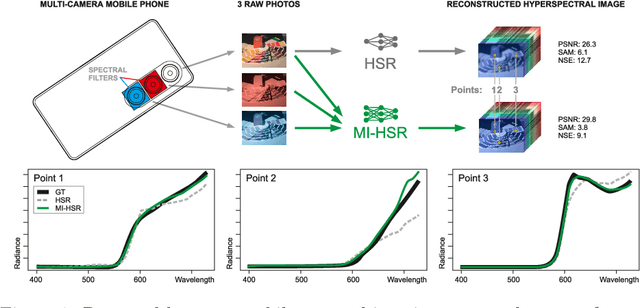

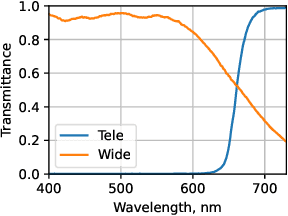

Abstract:Hyperspectral reconstruction (HSR) from RGB images is a fundamentally ill-posed problem due to severe spectral information loss. Existing approaches typically rely on a single RGB image, limiting reconstruction accuracy. In this work, we propose a novel multi-image-to-hyperspectral reconstruction (MI-HSR) framework that leverages a triple-camera smartphone system, where two lenses are equipped with carefully selected spectral filters. Our configuration, grounded in theoretical and empirical analysis, enables richer and more diverse spectral observations than conventional single-camera setups. To support this new paradigm, we introduce Doomer, the first dataset for MI-HSR, comprising aligned images from three smartphone cameras and a hyperspectral reference camera across diverse scenes. We show that the proposed HSR model achieves consistent improvements over existing methods on the newly proposed benchmark. In a nutshell, our setup allows 30% towards more accurately estimated spectra compared to an ordinary RGB camera. Our findings suggest that multi-view spectral filtering with commodity hardware can unlock more accurate and practical hyperspectral imaging solutions.
Color Matching Using Hypernetwork-Based Kolmogorov-Arnold Networks
Mar 14, 2025Abstract:We present cmKAN, a versatile framework for color matching. Given an input image with colors from a source color distribution, our method effectively and accurately maps these colors to match a target color distribution in both supervised and unsupervised settings. Our framework leverages the spline capabilities of Kolmogorov-Arnold Networks (KANs) to model the color matching between source and target distributions. Specifically, we developed a hypernetwork that generates spatially varying weight maps to control the nonlinear splines of a KAN, enabling accurate color matching. As part of this work, we introduce a first large-scale dataset of paired images captured by two distinct cameras and evaluate the efficacy of our and existing methods in matching colors. We evaluated our approach across various color-matching tasks, including: (1) raw-to-raw mapping, where the source color distribution is in one camera's raw color space and the target in another camera's raw space; (2) raw-to-sRGB mapping, where the source color distribution is in a camera's raw space and the target is in the display sRGB space, emulating the color rendering of a camera ISP; and (3) sRGB-to-sRGB mapping, where the goal is to transfer colors from a source sRGB space (e.g., produced by a source camera ISP) to a target sRGB space (e.g., from a different camera ISP). The results show that our method outperforms existing approaches by 37.3% on average for supervised and unsupervised cases while remaining lightweight compared to other methods. The codes, dataset, and pre-trained models are available at: https://github.com/gosha20777/cmKAN
Rawformer: Unpaired Raw-to-Raw Translation for Learnable Camera ISPs
Apr 16, 2024

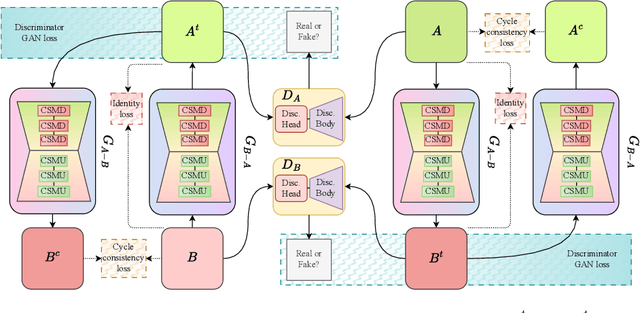

Abstract:Modern smartphone camera quality heavily relies on the image signal processor (ISP) to enhance captured raw images, utilizing carefully designed modules to produce final output images encoded in a standard color space (e.g., sRGB). Neural-based end-to-end learnable ISPs offer promising advancements, potentially replacing traditional ISPs with their ability to adapt without requiring extensive tuning for each new camera model, as is often the case for nearly every module in traditional ISPs. However, the key challenge with the recent learning-based ISPs is the urge to collect large paired datasets for each distinct camera model due to the influence of intrinsic camera characteristics on the formation of input raw images. This paper tackles this challenge by introducing a novel method for unpaired learning of raw-to-raw translation across diverse cameras. Specifically, we propose Rawformer, an unsupervised Transformer-based encoder-decoder method for raw-to-raw translation. It accurately maps raw images captured by a certain camera to the target camera, facilitating the generalization of learnable ISPs to new unseen cameras. Our method demonstrates superior performance on real camera datasets, achieving higher accuracy compared to previous state-of-the-art techniques, and preserving a more robust correlation between the original and translated raw images.
Learned Smartphone ISP on Mobile GPUs with Deep Learning, Mobile AI & AIM 2022 Challenge: Report
Nov 07, 2022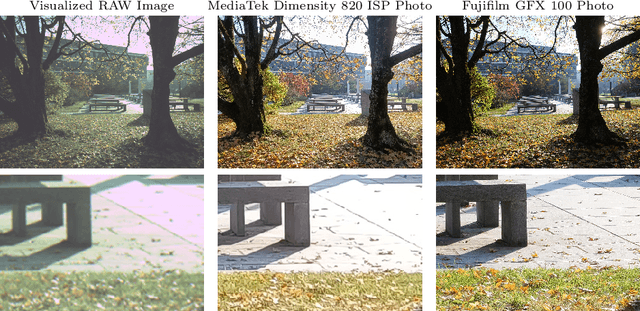

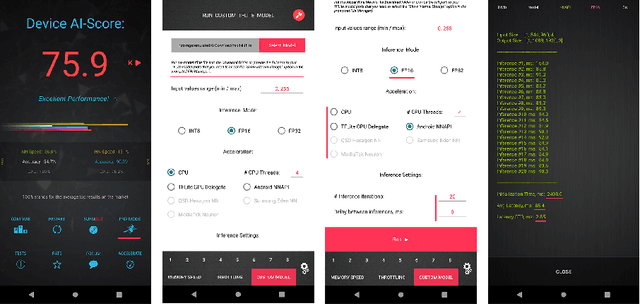

Abstract:The role of mobile cameras increased dramatically over the past few years, leading to more and more research in automatic image quality enhancement and RAW photo processing. In this Mobile AI challenge, the target was to develop an efficient end-to-end AI-based image signal processing (ISP) pipeline replacing the standard mobile ISPs that can run on modern smartphone GPUs using TensorFlow Lite. The participants were provided with a large-scale Fujifilm UltraISP dataset consisting of thousands of paired photos captured with a normal mobile camera sensor and a professional 102MP medium-format FujiFilm GFX100 camera. The runtime of the resulting models was evaluated on the Snapdragon's 8 Gen 1 GPU that provides excellent acceleration results for the majority of common deep learning ops. The proposed solutions are compatible with all recent mobile GPUs, being able to process Full HD photos in less than 20-50 milliseconds while achieving high fidelity results. A detailed description of all models developed in this challenge is provided in this paper.
 Add to Chrome
Add to Chrome Add to Firefox
Add to Firefox Add to Edge
Add to Edge